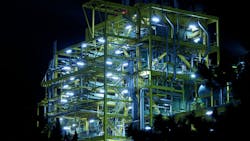Japan Factory Output, Household Spending Turn Down
TOKYO - Japanese factories put in an unexpectedly weak performance in June while household spending also slipped, official data showed Tuesday, underscoring the challenge Tokyo faces in kickstarting the world's third-largest economy.
The latest figures offer a mixed picture for Prime Minister Shinzo Abe's bid to stoke the deflation-plagued Japanese economy, after he unleashed a growth-boosting program dubbed "Abenomics" involving massive government spending and central bank monetary easing.
The key aim is to reverse years of falling prices which have held back growth, as the Bank of Japan aims to hit a 2% inflation target in as many years, an ambitious timeline that some analysts have cast doubt on.
On Monday, BoJ governor Haruhiko Kuroda said a planned sales tax hike would not derail Japan's recovery, as Abe mulls whether to usher in the increase that is seen as crucial to shrinking the country's massive debt.
The fresh data Tuesday showed that Japan's industrial production turned down 3.3% on-month in June as production of cars and electronic parts slipped, highlighting a mixed picture for demand overseas. The decline reversed a rise in May and was worse than the average economist expectations for a 1.7% decline, according to the leading Nikkei business daily.
Separate figures showed that household spending last month slipped 0.4% from a year earlier, despite expectations of a rise after earlier figures showed consumer prices went up for the first time in more than a year.
However, factory data was brighter on a quarterly basis with output expanding 1.4% between April and June, while a producer survey released with the figures was also optimistic.
Firms expect factory output to rise 6.5% in July and then slip 0.9% in August, it said.
Unemployment Lowest Since October 2008
"Industrial production shows signs of picking up at a moderate pace," the ministry of economy, trade and industry said in a statement.
Also upbeat was fresh jobs data that showed Japan's unemployment rate fell to 3.9% in June, the lowest point in more than four years.
The decline - from 4.1% in May - translated into the best reading since 3.8% posted in October 2008, according to the internal affairs ministry.
"A little sunlight is entering the job market where recovery tends to lag behind those in other economic areas," Yoshiki Shinke, chief economist at Dai-ichi Life Research Institute, told Dow Jones Newswires.
"On average, (factory) output remains on an upward trend, helped by brisk external demand and the weaker yen. So you don't have to worry too much about the declines in a single month," he added.
Economists have been sifting through economic data in the past few months looking for concrete signs that Tokyo's efforts to boost growth are taking hold.
A sharply weaker yen, driven down by Abe's economic policies, have helped exporters by making them more competitive overseas while lifting their repatriated foreign income, as Japan's latest quarterly earnings season gets underway.
However, the currency's dive has also pushed up the cost of imports, particularly energy, after Japan was forced to turn to pricey fossil-fuel imports after shutting its nuclear reactors in the wake of the Fukushima crisis two years ago.
Copyright Agence France-Presse, 2013
About the Author
Agence France-Presse
Copyright Agence France-Presse, 2002-2025. AFP text, photos, graphics and logos shall not be reproduced, published, broadcast, rewritten for broadcast or publication or redistributed directly or indirectly in any medium. AFP shall not be held liable for any delays, inaccuracies, errors or omissions in any AFP content, or for any actions taken in consequence.
